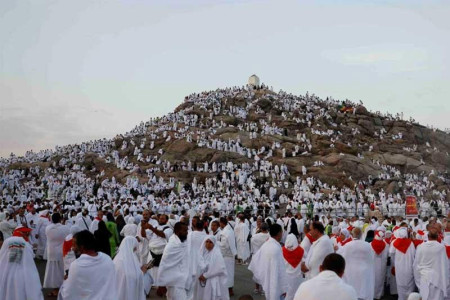All six of the dead are Jordanian citizens, the Jordanian foreign ministry said Saturday, adding that it was coordinating with Saudi authorities in Jeddah regarding burial procedures and possible transfer of their bodies back to Jordan.
News of the deaths comes as pilgrims gathered atop Mount Arafat on Saturday, marking the main event of the pilgrimage, with the niece of one of the deceased telling CNN Arabic that her aunt had died on Mount Arafat and was buried in Saudi Arabia.
More than 1.8 million people are taking part in Hajj this year, according to the Saudi General Authority for Statistics.
The Hajj is one of the biggest religious gatherings in the world and the largest annual event in Saudi Arabia.
It occurs two months and 10 days after Ramadan ends, during the Islamic month of Dhul-Hijjah. Because the Islamic calendar is lunar and shorter than the Gregorian calendar, the timing of Hajj on the Gregorian calendar shifts slightly each year.
This year, Saudi Arabia is expected to experience extreme heat over the five-day pilgrimage, with temperatures reaching 48 degrees Celsius (118 degrees Fahrenheit) in Mecca.
Hajj officials are asking pilgrims to carry umbrellas and stay hydrated amid the harsh conditions, the spokesman for the ministry of health Muhammad Al-Abdulaali said, according to the state news agency SPA.
The Saudi army has also deployed more than 1,600 personnel with medical units specifically for heatstroke and 30 rapid response teams. Another 5,000 health and first aid volunteers are taking part.
Jordan has previously said there were more than 4,000 pilgrims in its official delegation this year.
However, the foreign ministry clarified that the six who died were not part of the “official delegation,” meaning they did not have valid Hajj licenses to perform the pilgrimage.
Performing Hajj is one of the five pillars of Islam.
Islam requires every Muslim who is physically and financially able to make the journey to the holy city of Mecca at least once in his or her life.
The pilgrimage includes numerous detailed rituals including wearing a special garment that symbolizes human equality and unity before God, a circular, counter-clockwise procession around the Kaaba, and the symbolic stoning of evil.
People who have completed the pilgrimage may add the phrase al-Hajj or hajji (pilgrim) to their names.
Over the past decade, Saudi Arabia has invested billions of dollars to upgrade transport, technology and accommodation for pilgrims performing Hajj – a key source of income for the world’s largest oil producer.
cnn


